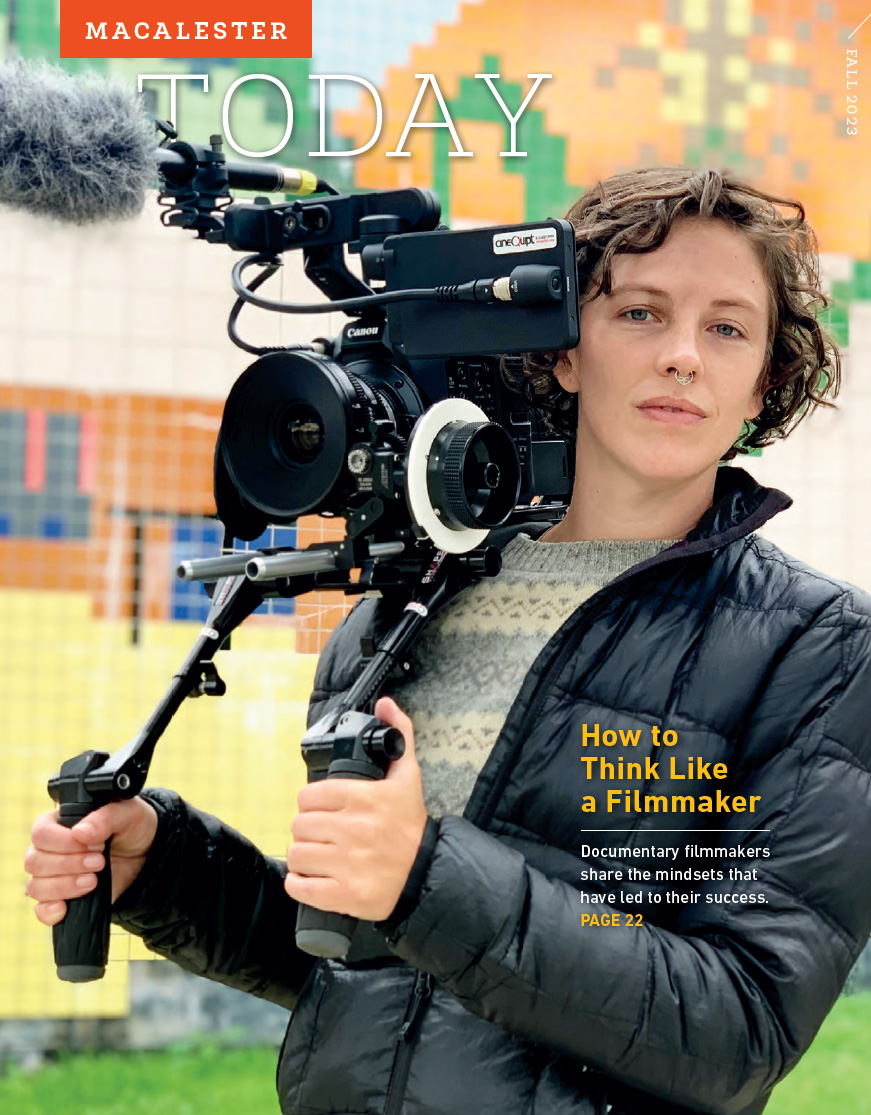
By Ashli Cean Landa / Photo by David J. Turner
Macalester continues to expand, deepen, and strengthen equity and social justice across the college. Established in 2022, Macalester’s Division of Institutional Equity comprises the Lealtad-Suzuki Center for Social Justice, the Center for Religious and Spiritual Life, and the Title IX and Non-Discrimination Office, as well as positions with focused attention on college-wide programs and institutional change work. Institutional Equity was chosen as the division’s name to emphasize equity practice and principles as central to the division and foundational to the college.
The Lealtad-Suzuki Center for Social Justice (LSC) represents an important slice of Macalester’s equity work. When the Department of Multicultural Life (DML) was established in 2002, it had several programming avenues, and the LSC encompassed its student-facing work. The work of the LSC has been expanded to many areas across the college and into the division of Institutional Equity, extending its reach and deepening its impact. Today, the LSC provides social justice education, and fosters resources, advocacy, and programs with BIPOC; LGBTQIA2S+; first-generation; and DACA, undocumented, and mixed-status student communities. It also contributes to college-wide efforts and educational programs.
As the LSC celebrates twenty years of equity work, three current and recent directors sat down to discuss the center’s evolution, the necessity of asking and answering uncomfortable and complex questions, and how social justice advocates have been encouraging change for more than two decades.
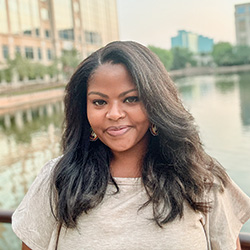
Director (2020-)
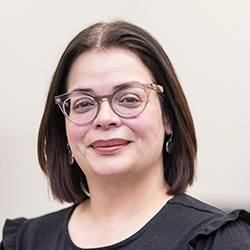
Freeman
Director (2015-2017)
Founder and CEO of
Taina Coaching &
Training
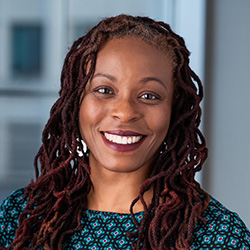
Director (2002-2015)
Title IX coordinator
and director of equity
(2015-2017)
Executive director,
Jeremiah Program
St. Paul
The historical heartbeat of the LSC
HANA: We can’t talk about the twentieth anniversary without identifying the throughlines from our past. We’ve been thinking about the Ghanaian concept of sankofa, which is to go back and retrieve what’s good as you move forward. We have to know who we are and what our work is about if we’re going to move forward and not have to reinvent the wheel.
KARLA: It’s often the histories of marginalized folks that don’t get told from their lens, if it gets told at all. When we think about diversity, equity, and inclusion at Macalester, you can go all the way back to when women were admitted. There was a time when you had to be white, male, and Christian to come here. Catharine Lealtad, the first Black student, helped change that in 1915.
AIDA: There have always been pivotal moments in our histories, and part of the journey to this celebration is this reckoning of where we’re at now. What’s the future of Macalester? Especially post-affirmative action. We’re seeing a society that’s consistently erasing and rewriting history, shifting in narratives. Losing touch with the historical context of our last twenty years, the time and movements before it, puts us in danger of not only minimizing, but shrinking the importance of why it matters. The LSC is truly a special place—whether it’s been with Karla, me, Hana, and others along the way, this has been a labor of love gifted to the next generation.
The legacy of the Expanded Educational Opportunities program
HANA: It’s hard to identify exactly when equity work starts on a college campus, but in the way we understand it now, it was the Expanded Educational Opportunities program—EEO.
Many diversity and equity offices at other institutions celebrated their fiftieth anniversary around 2019. This is because many of them came about around the same time—they are the result of the civil rights movement, the fight for ethnic studies, and student activism in the late ’60s. For me, the history of our office and our work, in general, starts with Dr. John Lewis Warfield and Agieb Bilal ’74, who came to Macalester in 1969 and were tasked with implementing the EEO program.
KARLA: The Black and Brown students that came to Macalester at that time completely shifted how this college had to operate. We talk about it now in a positive light, but at the time, those students were civil rights activists in a place that wasn’t ready to fully accept them, which is why this office was first created. They fought for ethnic studies courses, for faculty who look like them, for curriculum that reflected the diverse histories of BIPOC communities. A throughline of all these different iterations is the consistency of that heartbeat, that legacy.
AIDA: It was contested, but it was what made Macalester what it now prides itself to be. That group radically pushed the envelope.
HANA: A lot of what drew me to Macalester—its history and reputation as this progressive, activist institution—comes from that time.
AIDA: There have been periods in history when we have gained this level of clarity about what the right thing to do is and have become bold in our decisions, like the development of EEO. It was seeing the call, the need, and the opportunity to be part of something very powerful. That pivotal moment shifted its history. Was the college ready for what was to come? Probably not, but that’s not unique to Macalester.
And the EEO alumni became such an integral part of the fabric of who Macalester really is. It became a place that alumni can look back on and be proud of, but also be critical about what’s still happening. But the fact that you’re hearing from them actively…
HANA: Means they care.
AIDA: They care. There’s still commitment to seeing Macalester be the best that it can be.
KARLA: When folks are critical, it means they care greatly and they want others to have a better experience—they want to call the college to task to do better. And these alumni are proud alumni.
AIDA: They’re fired up.
KARLA: They get fired up because they love Macalester. They love their classmates and they love the mission of Macalester.
Passing the baton
KARLA: In 2002, when I came as the first director of the LSC, it was a programmatic arm of the DML. When we started, the purpose of the DML and the LSC was to make sure that all spaces in the college are inclusive and equitable, so that any student can go to Mac and be treated well, and have a space of support and affirmation for historically marginalized students.
We were clear: we needed to center the experiences and the lives of historically marginalized people in all aspects of the college, which truly benefits everyone. For example, if a student of color is treated badly in a class, the solution isn’t to just send them to an equity office—we need to address the root cause. The issue is not rooted in the folks who are historically marginalized—it’s rooted in a biased system that needs to change.
AIDA: When I came in 2015, my job was to elevate that work and increase faculty and staff buy-in. We also are educators, so we looked at the idea of a classroom experience, the learning space outside of those walls, mobilizing our campus community to learn and grow and discern.
HANA: I started in fall 2020, following the George Floyd uprising and COVID lockdown. That first year was very challenging. Our department was spread thin trying to support everyone on campus; it was very difficult to watch our students struggle. Everything felt reactionary; we couldn’t catch our breath. For me, that first year highlighted the cracks in our structure—it helped me see where we need to grow and adjust as a department.
KARLA: George Floyd’s murder brought a reckoning. It was violent and in your face. It couldn’t be ignored. To be on a college campus at that time, I can only imagine—everything’s virtual, it’s COVID, and students are just…
HANA: All over the place. Many of our students were out in the streets protesting; they wanted answers and immediate change. We spent a lot of time helping our students process what they were seeing and feeling. We just sat with them, cried with them, and tried to help them understand the difference between mobilizing and organizing—the effort and strategies it takes to build lasting change. We had to do all of this on Zoom or masked up and six feet apart.
Intentionality and the future
HANA: The LSC restructuring has given us the capacity to reimagine how we do this work. As always, our work will continue to uplift and center the voices of those most marginalized in our society and collaborate with all students, staff, and faculty to build a transformative community. We are a nontraditional classroom space—a brave space where we can gather and grapple with the difficult issues facing our communities locally and globally.
KARLA: Even with the staffing and programming changes, I love that there was always a progression, an elevation of the positive things that have happened. Some offices in other institutions didn’t survive that, because there wasn’t that longevity of mission. Our vision has never been rooted in one person.
HANA: I don’t know if I would’ve taken this position had I not seen you two in it. There’s always been some connection, some maintained relationships between people that work here. My first role at Mac was as a hall director when you, Karla, were moving into your Title IX position, and Aida, you just came in, so I got to observe you doing this work.
I felt really well-prepared when I came into this position, even with the challenges. I was able to keep going and understand that there’s something incredible possible because I knew what the vision was.
KARLA: Equity work requires a lot of intentionality. That’s why it’s so hard, and that’s why people are afraid of it—being equitable means your work has to change, and you have to do things differently.
AIDA: Oftentimes we don’t pause enough to see that clear progression of movement forward. We just assume that we’re not where we need to be. But the reality is that things that were dreamed up back then are happening now. We can say, why did that take twenty years? But when we think about the long history of Macalester, the strength of white supremacy and patriarchy, it really is remarkable what has happened in that time.
KARLA: It’s actually pretty remarkable.
AIDA: I think hope from a radical space—that critical hope that comes through—lives naturally in all of us as human beings, and moves us to keep doing this work. I think I can say for all of us that we’re just excited for the future, of what is to come and what is possible. And we continue to invite Macalester to reimagine; to stay grounded in its history; to re-envision the possibilities; to be bold and courageous and do the real work. Not just the easy stuff. But to live it, in the mucky messiness of it that’s so beautiful and so necessary. That’s where I think the hope of our humanity really rests.
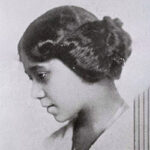
Dr. Catharine Deaver Lealtad was Macalester College’s first Black graduate. She earned a double major degree in chemistry and history in 1915 with highest honors. Dr. Lealtad’s historic, international career ranged from supervising children’s medical services during World War II to mission hospitals in Puerto Rico. She is the only person to receive two honorary degrees from the college.
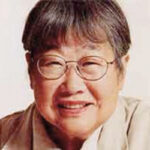
At age 16, Esther Torii Suzuki was the first Japanese American student at Macalester in 1942, when she was released from a Japanese detention camp because of her acceptance into the college. She graduated in 1946 with an honors degree in sociology. Ms. Suzuki was a community leader, civil rights activist, volunteer, and mentor. The renaming of the Lealtad-Suzuki Center to the Lealtad-Suzuki Center for Social Justice affirms the college’s commitment to social justice education and community building through an intersectional framework. “We have always been about social justice,” says Karla Benson Rutten. “This vision has always been the same, except now the name really reflects the goal of the work.”
Ashli Cean Landa is a writer and editor at Macalester.
November 1 2023
Back to top